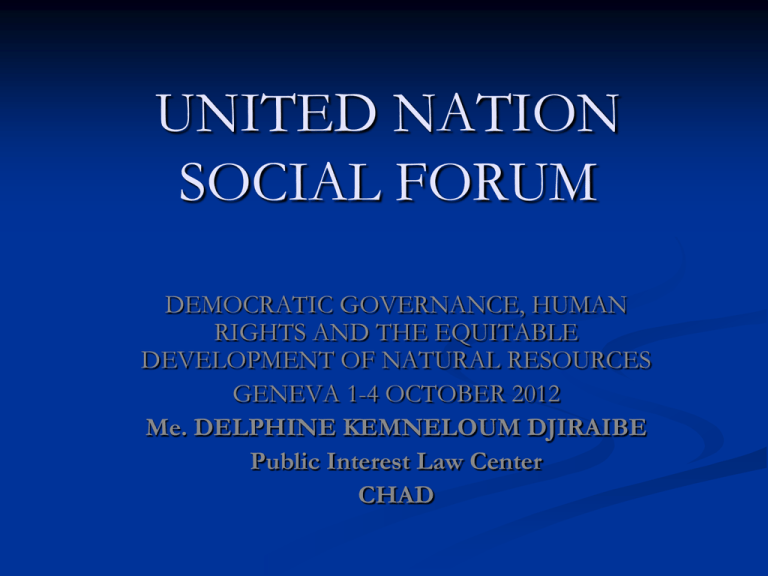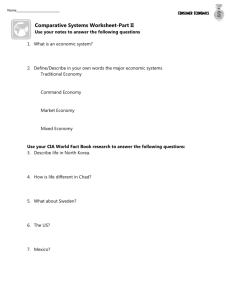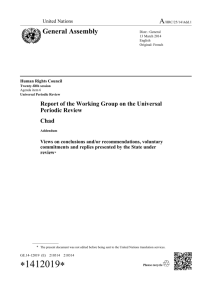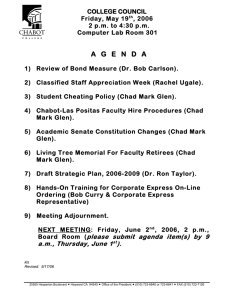UNITED NATION SOCIAL FORUM
advertisement

UNITED NATION SOCIAL FORUM DEMOCRATIC GOVERNANCE, HUMAN RIGHTS AND THE EQUITABLE DEVELOPMENT OF NATURAL RESOURCES GENEVA 1-4 OCTOBER 2012 Me. DELPHINE KEMNELOUM DJIRAIBE Public Interest Law Center CHAD DEMOCRATIC GOVERNANCE To build democratic governance, the biggest challenge is to develop institutions and processes that are more responsive to the needs of ordinary citizens including the poor. Democratic governance should promote development at the same time. Such processes must encourage: participation accountability effectiveness at all levels. - WHO CONTROLS POWER CONTROLS OIL MONEY Without democratic governance, sustainable people-centered development is not possible. Chad exemplifies how a lack of democratic governance can drastically undermine opportunities for sustainable development and elevate poverty. Chad’s oil wealth has deepened the gap between rich and poor and exacerbated armed conflicts over power: “who controls power controls oil money.” REPUBLIC OF CHAD REPUBLIC OF CHAD Population: about 11 million 52% of women 11 august 1960: independence from France 1975: assassination of the first president of the republic of Chad 1979: Civil war in N’djamena the capital city 1982: Hissen Habre’s dictatorship regime 1990: Idriss Deby’s so called democratic regime 1993: National Sovereign Conference 1996: Constitutional referendum 2005: Amendment to the constitution to remove the limitation term 2007: Political agreement to strengthen democratic process 2006: Rebels group attack on N’djamena 2008: Second rebel group attack on N’djamena. President Idriss Deby who took power by “coup d’etat” has legitimate himself by rigged and contested elections and is in power since 1990 (22 years) CHAD IS AN OIL PRODUCING COUNTRY SINCE 2003 Since 2000 the World Bank has approved the Chad Cameroon pipeline known as the Chad Cameroon project (1070 length of pipeline, estimated 1.5 million of barrels). The objective of the project is to help Chad elevate its poverty and start sustainable development. The project was completed a head of the planed time and oil revenue started flowing since 2003. As soon as the government start getting the oil revenue, the all governance of the country has begun to crumple. The government has changed the law governing the management of the oil revenue to include the security sector among the priority sectors ( education, health , agriculture and infrastructure). The constitution has also been changed to allow President Deby to run for presidency without limitation. It has been a starting point for the exacerbation of armed conflict, massive violation of human rights. Including, unlawful arrest, violation of freedom of press and of opinion, rampant corruption and insecurity. As result majority of the population has become poorer than they were before the exploitation of oil. THE ROLE OF CIVIL SOCIETY The civil society in Chad has played a key role by helping redesigning the project to include control measures and mainly to be a watchdog in order to alert the World Bank and the government of Chad on the risk of the failure of the project. Despite their warnings they were not listening and the project has turned to a disaster for the Chadian population. SOME EXAMPLES In 2007, military and security spending totaled 161.49 billion FCFA compare to 38.55 billion FCFA for the 4 priority areas combined (education, health, agriculture and livestock). Military spending of the Chadian State increased from 35.39 billions FCFA in 2004 to 275.71 billions in 2008, corresponding to an increase of 240.31 billions FCFA within four years. BUDGET OVERVIEW SINCE THE OIL PRODUCTION YEAR 2004 2005 BUDGET 199 906 793 171 296 483 229 806 OIL REVENUES % OF OIL REVENUES 82 810 741 000 38,67% 125 522 382 675 42,34% 2006 579 946 624 253 383 507 000 000 64,94% 2007 767 083 187 852 559 869 000 000 73,21% 2008 1 044 972 877 395 704 529 000 000 72,88% 2009 560 066 666 736 486 700 000 000 56,88% 2010 1 034 381 000 000 591 475 000 000 57,18% 2011 1 572 482 233 000 939 861 230 000 59,76% 2012 1 366 624 000 000 664 870 000 000 48,65% CURRENT SITUATION Socio-political and security crisis is occurring now in Chad and may impact negatively the precarious peace expensively acquired. Poor governance including the non fairly redistribution of national wealth (oil revenue); misused of public fund, confiscation of the country's wealth in favor of the ruling minority, the unaffordable cost of living ... are evils that undermine the country’s peace. Union leaders, journalists and civil servants are prosecuted and sentenced to prison and heavy fine after unfair trial for acts of strike and / or for relaying information about it. CONCLUSION This is an opportunity to call for international solidarity to act for the protection of the Chadian population and to consolidate peace. Thank You for your kind attention.


